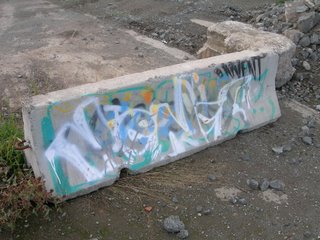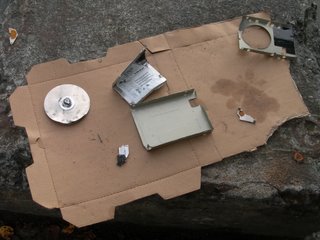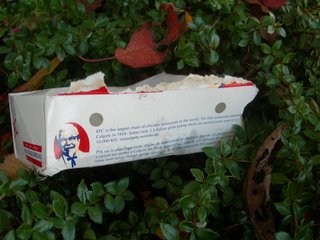Anodyne
Tuesday, October 31, 2006

There's a starman waiting in the sky
He'd like to come and meet us
But he thinks he'd blow our minds
There's a starman waiting in the sky
He's told us not to blow it
Cause he knows it's all worthwhile
He told me:
Let the children lose it
Let the children use it
Let all the children boogie...

I took a, I took a walk in space
Boy, I really felt blue
Well I peeped through the crack
And looked way back
Stardust trail leading back to you
What did I do
What could I do
Yes, what did I do
Well I thought about you
I thought about you
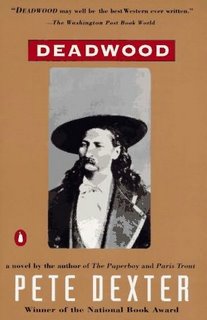
Q: What could be worse than missing the last ferry from Vancouver Island back to the mainland on Friday night?
A#1: A fruitless $65 cab ride from Victoria to Swartz Bay:
Q: Where's the boat?
A: See those [rapidly retreating] lights?
Q: FUCK!
A: Hey, watch your language!
A#2: A 5km walk back down Highway 17 to the Sidney Travelodge. In the dark, in the gently pouring rain, headlights of big semis sweeping past over my head. Kids setting off fireworks from the comfort of the dugout at the local high school ballfield. Pweet.....bang! Showers of sparks. Striding along, rain picking up now, under overpasses and highway bridges. The headlights of oncoming cars.
A#3: [Repeatedly] throwing up at 3am.
A#4: Not realizing you've been flirted with until the moment you could do anything about it is long gone. Thanks, Sudafed!
A postcard from my neighbor, Aurora's Jeff Van Geest, currently in Italy at a "slow food conference."
C.V.
"Toth has been a bicycle courier, a commercial fisherman, an electrician, a long-haul truck driver, a landscaper, a rock drummer, a process server, a warehouse flunky and a winemaker. Adding artist and astronaut to this list hardly stretches things.
Q: Which of your jobs best prepared you for the Nascanti?
A: Oh, you don’t prepare for those guys.
Q: Why’s that?
A: I think I said it best in that piece that [Swiss industrial magnate and video-art collector Jonathan] Schellmann owns.
Hi, How Are You? (2009): Toth’s head and shoulders are visible against a pale grey backdrop. Staring straight into the camera he slowly says, 'Hi. How are you? I am fine.' Pauses. Blinks. Repeats himself. Pauses. Blinks again. Delivers his lines. And so on, ad infinitum.
'That was a -- my -- response to that whole mess,' he says. Six weeks of blood tests, of MRI imaging, of endless debriefings by military psychologists, astrophysicists, biologists and engineers. Granular scrutiny of his patent application, the one based on the chemical formula the Nascanti gave him in exchange for a video projection and two photographs."
Monday, October 30, 2006
Sunday, October 29, 2006

The new story is called The Nearest Faraway Place.
"Asked about To Build A Fire, Toth doesn’t mention Jack London, or Buster Keaton, or video art, or Sigma Octanis, the F-class star 270 light years from Earth, where most astronomers and exobiologists seem sure he’s been. He talks about himself."
Odd, and Getting Odder -- 2006 interview with literary role model Russell Hoban
"[T]hen there is H P Lovecraft, to whose Cthulu stories Hoban pays wrily mocking homage from time to time in his own work. 'He's not too much an influence, I just love him,' he says. 'You know I read Lovecraft to all our sons when they were small. Friends and strangers,' - he is laughing - 'would say, oh my God, what are you doing, don't read them that stuff, you're doing them immense psychological harm! But, ah, they recall it very fondly.'"
Saturday, October 28, 2006
CUSTOMER: Hi. I'd like to return this book for credit [Jay Bonansinga's Twisted, a mass market paperback thriller].
CJB: You just bought it on Thursday. Is there a problem?
CUSTOMER: Yeah. The first paragraph on page 64.
VERBATIM: "The statuesque blonde woman in the diaphanous linen top and thong bikini crouched against the raging salt winds, grimacing, struggling with a loop of nylon rope, completely unaware that it was the last time she would secure a storm tarp over her beloved little motel's swimming pool."
CUSTOMER: See?
CJB: I agree. I'd want my money back, too.
Thursday, October 26, 2006

Best Dialogue Balloon in a Mainstream American Comic Book, 2006
"Look around, Mr. Snow. A crew of superhuman ancestors of the City Zero survivors, saved by you and Miss Hark to pilot a sailing ship of the multiverse itself."
(Warren Ellis, Planetary #26)

Deep into that New Yorker article from the future, composing, as usual, by wandering around Vancouver's suburbs in the rain accompanied by canvas "duster," fluorescent orange MEC rain hat, lined yellow newprint pad, numerous defective stick pens, and coffee. Once the rough draft is complete, I'll post some excerpts from it.
Also transcribing my Toronto talk on Evan Lee for C. magazine, and writing a short review of Geoffrey Farmer's as-yet untitled installation at Catriona Jeffries Gallery for Montreal's Vie des Arts. So, if the next few weeks of entries simply consist of YouTube links and silly Flash animations, picture me working hard in longhand, somewhere far from the internets' tubes (eg., bustling downtown Langley City, above).
Recent reading: Francine Prose, Reading Like a Writer: A Guide For People Who Love Books and For Those Who Want to Write Them. Prose's clarity, brevity, and generosity of advice remind me of Stephen King's excellent memoir On Writing. Prose might not be happy to find herself compared to "America's favorite schlockmeister," but these two small books, which even physically resemble each other, now sit side-by-side beside Strunk & White and the OED on my recently uncovered work table. Prose and I admire many of the same writers; her close readings of Henry Green, Alice Munro, Mavis Gallant and David Gates are particularly incisive.

Robert Frank photocollage, 1 of 6 sheets from his Collage Suite, 1980. On display right now at Vancouver's Equinox Gallery, as part of Altered Image, a surprisingly generous group show including Peter Doig, Gerhard Richter, Joanne Tod, Gordon Smith, Jason McLean, Jack Shadbolt & etc.
Wednesday, October 25, 2006

ACT (Aesthetically Claimed Thing): Cat Bowling
Happy Hallowe'en from me and the Incredible Talking Cats!

Anodyne, Inc. Offering Prospectus
Another game, born of sitting at New Maple Wonton House on Broadway with broccoli beef, hot and sour soup, and a stack of annual reports. Local Art World Luminary slid into the booth opposite me, did a double-take, and tried and failed to reconcile Mr. Hardcore Capitalist with the kinder, gentler cjb that apparently exists in his imagination.
I started stock-picking in fourth or fifth grade (c. 1978? 79?), when Brian Herrin, the best non-university teacher I ever had, asked everyone in my class to construct and maintain a model portfolio for a month. Mine had Imperial Oil and and a few other large-cap TSE favorites in it. We ignored frictional transaction costs (brokerage charges, etc.). I came in third or fourth out of thirty-two or thirty-three participants, and was hooked for life.
In 1989, I was running Anodyne, the short-lived "independent nonprofit art exhibition space" this weblog takes its name from, out of a second floor office in a heritage building on Granville Street. I was open Saturdays and Sundays 12-5pm, and had lots of time between visitors. To pass the time, I paid off my fines, reactivated my Vancouver public library card, and started checking out stacks of books, including Roger Lowenstein's Buffett: The Making of an American Capitalist. This lucid, well-written, and tough but fair biography of Omaha-based investor Warren Buffett is the most life-changing book I have ever read (Appropriately enough, it was agented by Thomas Pynchon's wife, Melanie Jackson). There would be no Pulpfiction Books without it, and definitely no CSA Space.
Lowenstein, a gifted financial journalist and early investor in Buffett's Berkshire Hathaway, Inc., somehow synthesized a whole spectrum of information that I had absorbed but never processed further. He (and, later, Buffett himself, in publications like his Columbia University talk "The Superinvestors of Graham and Doddsville") provided a conceptual framework for me, demonstrating that successful securities analysis is, at heart, a cross between book scouting and art criticism, the sort of thing that I, with my constant depression and weird personality quirks, am apparently well-suited to perform.
A simple public challenge: outperform the TSE (80%+ of Canadian mutual funds don't, on a year-by-year basis). Tonight I took $100,000CDN in play money, and invested it in a number of Canadian companies and income trusts, according to my amateur understanding of "deep value investing" as promulgated by Benjamin Graham, Buffett, David Dreman, Marty Whitman, Irwin Michael, & etc. Anodyne, Inc.'s initial portfolio is as follows:
Dominion Citrus Income Fund (DOM.UN) 12,346 units @ .81 = $10000.26
E-L Financial Corporation (ELF) 7 shares @ $610 = $4270.00
Hart Stores (HIS) 5769 shares @ $5.20 = $29998.80
Loblaw Companies (L) 217 shares @ $46.15 = $10014.55
Norbord, Inc. (NBD) 1208 shares @ $8.26 = $9978.08
North West Company Fund (NWF.UN) 600 units @ $16.80 = $10080.00
Parkland Income Fund (PKI.UN) 746 units @ $33.65 = $25102.90
Total Cash Invested: $99444.59
Transaction Charges ($25 each buy/sell): $175.00
Cash Balance: $380.41
Today's SP/TSX: 12341.65
Some provisios:
• This is a serious game, but a game nonetheless. Anodyne Inc.'s positions aren't suggestions to buy or sell any security. I own some of these securities in real life as components of a diversified RRSP portfolio.
• Transaction charges: $25 per buy and sell. "Odd lot" charges ignored. Dividends and income trust distributions credited to cash on the date received. Cash earns no interest.
• The TSE index figure is included because I aim to beat the index's total return (eg.. growth plus reinvested dividends). There is no speculation involved in buying the index; if I represent myself as a skilled investor, this is a hurdle I should be easily able to clear.
• I will grade my performance (as should you) over a three to five year horizon. Over shorter periods of time, the portfolio may fluctuate in value, sometimes impressively. These short-term variations don't bother me, and they shouldn't bother you, either.
• Despite grading my performance over the medium to long-term, I will report on the portfolio's progress, positively or negatively, once every 3 months.
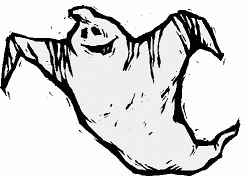
"With Halloween just around the corner, nearly half of Canadians claim they believe in ghosts, according to a new Canada Speaks survey released by Sympatico / MSN. The survey, conducted by Ipsos-Reid revealed that Canadians in Ontario/Atlantic provinces (50 per cent), and those kids in their household (55 per cent vs. 44 per cent among those without kids), are more likely to believe in ghosts. But 32 per cent of ghost-believers feel that ghosts are usually 'forces of good' rather than 'forces of evil' (8%).
Of those surveyed, one in five Canadians say they've been in the presence of ghosts (18 per cent); 9 per cent have lived in a haunted house; 9 per cent have 'visited with the ghost of a dead relative' and 12 per cent have had an 'out-of-body experience' or say they know someone who has (15 per cent)."
(via S.)
In The Batcave
Scarce here for a few days, deep into transcribing last week's New Yorker article from the future. Grey October outside, rain moving in from Vancouver Island. Sweater and canvas coat weather, cold late fall air on my shaved scalp. No idea why, after so many years of silence, fiction should present itself again, but I think it has something to do with all these entries here. Three years of scales, then short bursts of improvisation. Zwah be dah be dah... And the Nascanti, 2014's art-collecting aliens, turn out to be a hoot to write. "Maybe they could take [PROMINENT YOUNG CANADIAN ART STAR]," suggests a friend. "Permanently." Not a bad idea, though I suspect they have better taste.
Tuesday, October 24, 2006

Potpourri
On the express bus, an artworld colleague shows me a handful of autumn leaves, all reds and yellows and greens.
"A person was unlikely to enjoy asking favours from a position of grotesque inferiority." (A.L. Kennedy)
"He stood up and went to the table where he'd thrown his pants over the typewriter when he'd come in last night. He got his wallet out of the back pocket, some folding money out of the front pocket. The change fell on the floor, quarters and dimes scattering over the room in a way that might have resembled the beginning of the universe. It wasn't ten o'clock in the morning and he'd already discovered the big bang." (Pete Dexter)
"Ill equipped and even more ill prepared, Mr. Newby never made it to the top of Mir Samir, though not for lack of imagination. To train for the ascent up the rock-strewn, icy mountain, he spent four days rock climbing in the Welsh countryside. He struck out for Afghanistan armed with British resoluteness, a pair of new boots and an exquisite taste for the absurd.
He also carried a very useful pamphlet on how to climb mountains, which he stopped to read on the slopes of Mir Samir, just a thousand feet from the summit." (NYT obituary of Eric Newby, above, world traveller and amateur mountaineer)
Monday, October 23, 2006
Recent reading:
Bob Woodward, State of Denial
Pete Dexter, God's Pocket
Stephen King, Lisey's Story
"It was almost incidental, what you had for issues. But how you saw things, how physical things went into your eyes and what your brain took and what it threw back, that told you who you were."
The musings of Dexter's alcoholic reporter, Richard Shellburn, the "people's voice," about to compose a long and maudlin essay meant to get himself laid, which unfortunately generates 134 calls of complaint to the paper -- "They're pissing into the phones," says his worried assistant -- and Shellburn's subsequent beating death at the hands of a mob outside the Hollywood Bar.
There is a line of fictional alcoholic journalists that goes straight from Shellburn to the hapless unnamed reporter in Faulkner's Pylon:
"'[I]t's not the living breath of news. It's just information. It's dead before you even get back here with it.' Immobile beyond the lamp's hard radius the reporter stood, watching the editor with an air leashed, attentive, and alert. 'It's like trying to read something in a foreign language. You know it ought to be there; maybe you know by God it is there. But that's all. Can it be by some horrible mischance that without knowing it you listen and see in one language and then do what you call writing in another? How does it sound when you read it to yourself?'
'When I read what?' the reporter said. Then he sat down in the opposite chair while the editor cursed him."
I have a lot of sympathy for these busted losers: Pylon's reporter, who would like to be Hemingway, but somehow lacks style's internal swing, and Shellburn, with his white corpse skin and sexually predatory ways (A typical Shellburn line: "She was a pretty girl, but she wasn't troubled enough to be much of a piece of ass."). Both men are professionally and emotionally crippled failures who still manage, from time to time, to articulate something like aesthetic sense. Shellburn's attachment to "physical things," above, is a good epigraph for the art movements which, for lack of a better term, we call realism.
Sunday, October 22, 2006

I Rearrange to Suit You
That amazing guitar riff, so reminiscent of 1978 fall Sundays, CKNW 980 on in my parents' red-tiled kitchen, and -- more recently -- of browsing for Abercrombie & Fitch Big Shirts in CTS' crowded aisles. In the air tonight, 12:30 a.m., cjb & the rickety Legacy crossing the Cambie Bridge, heavy sea fog blowing through, the bridge's yellow lamps shining like luminous gas giants, will o' the whisps, ignis fatuus....
Saturday, October 21, 2006
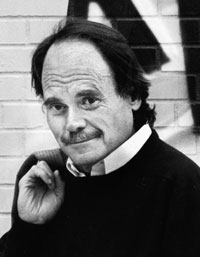
Pete Dexter, God's Pocket:
"Mickey Scarpato was forty-five years old and did not understand women. It wasn't the way bartenders or comedians didn't understand women, it was the way poor people didn't understand the economy. You could stand outside the Girard Bank Building every day of your life and never guess anything about what went on in there. That's why, in their hearts, they'd always rather stick up a 7-11."
Pete Dexter, God's Pocket:
"There was a time when his awkward way around her was nice -- after all the others it was sweet, a man like a boy -- but when she'd finally needed him for something, he'd been afraid to get near it."
Friday, October 20, 2006

Hoping For Replacement
Up Grouse Mountain from sea level, past Lonsdale's produce stalls, a KFC ghost (#31, still on the camera card), landscaping trucks, Mosquito Creek, dripping forest. Singing Neil Young's After The Gold Rush over and over in my shaky cracked voice. Braided streams. Sunlight, steeply aslant through the trees at a quarter to six, just below the little green valley on the BCMC trail. Singing the Bee Gees' Nights on Broadway, the Magnetic Fields' No One Will Ever Love You Honestly, the Pet Shop Boys' Being Boring (qv. numerous past entries). No one's idea of a top twenty countdown, least of all my own, but it puts the black bears on notice. Red (big) Skyride not running due to cable maintenance; 45 minute lineup full of video camera-toting tourons for the smaller, "blue" Skyride. Like riding down the mountain in a creaking, swaying Volkswagen Bug with your fifty closest friends.
Thursday, October 19, 2006
First really cold evening of fall. High wind, sending flurries of red and yellow leaves down off Columbia Street, scattering over the wooden bins of 29 cent pumpkins, 19 cent cabbages, 99 cent Macs and Fujis and Jonagolds.
Ranadall Woods' LBJ: Architect of American Ambition propped open on my lap on Skytrain.
Cool late fall sunlight, the last traces of last night's storm furling away up the Valley. Crown, Grouse, Fromme and Seymour slowly emerging from the mist.
Yellow lined newsprint pad, Bic stick pen.
GUESS THE PUMPKIN'S WEIGHT. WIN A PRIZE!
NO TOUCHING! VISUAL INSPECTION ONLY!
Wednesday, October 18, 2006
CJB Contra Corporate Thrift Store, Round 3
Excerpt from novelist William Gibson's exemplary essay, "My Obsession":
"When I was a young man, traversing the '70s in whatever post-hippie, pre-slacker mode I could manage, I made a substantial part of my living, such as it was, in a myriad of minuscule supply-and-demand gaps that have now largely closed. I was what antique dealers call a 'picker,' a semi-savvy haunter of Salvation Army thrift shops, from which I would extract objects of obscure desire that I knew were up-marketable to specialist dealers, who sold in turn to collectors. To this day I am often unable to resist a professionally quick, carefully dispassionate scan over the contents of any thrift shop, though I almost never buy anything there. Mainly because the cut-rate treasures, the 'scores' of legend, are long gone. The market has been rationalized."
In other words, the knowledge I acquired first-hand from Gavin, and from the better part of a decade behind the Book & Comic Emporium buying counter, is now available to anyone with an Internet connection, cell phone, or wireless handheld barcode scanner. I'm not reflexively negative about this; no one is entitled to cheap books in perpetuity, and anyone whose business model simply consists of showing up at the local thrift store every morning is running a hobby business, not a real business.
And yet...
William Hoffer, a legendary Vancouver antiquarian bookseller whose crankiness far outweighs my own, once explained our trade this way: you're not paying for the book (ink, paper, binding, etc.), but the ability to walk in and find it on the shelf.
Why is a mediocre mass market paperback like John Grisham's The Client $4.95 in my shop, and $1.00 at the Salvation Army? Well, because I paid 40% of my retail price for it, instead of receiving it as a donation, and because my copy isn't spined and dog-eared, and because all the books in my shop are neatly arranged in alphabetical order, and because I stock nearly all of Grisham's books, not just that single title, and because if I should somehow be out of it when you come in I'll find you a copy in a week or two at no additional charge, and because, if you ask, the staff and I will recommend other, better, books that you might enjoy more, and because, assuming you do buy a book from me and don't read it in the bath, I'll offer you trade or cash when you bring it back. The Salvation Army will just take your dollar and send you on your way.
Corporate Thrift Store now charges as much as I do for pocket books. Apparently their owners and managers got William Gibson's memo about the rationalized playing field. So their copy of The Client costs the same as mine, but with none of the value-added services.
I once saw six Easton Press hardbacks in Corporate Thrift Store, in the locked "collectables" showcase, priced $49.99 apiece. Coincidentally, I had around 100 Eastons in the shop at that point, for which I had paid, on average, $25 apiece, and priced $34.95-$49.95.
Where had CTS' Eastons come from? Probably from someone who wanted to help out Big Brothers, or the Canadian Diabetes Association, and had donated their Eastons to them out of good will, not realizing that their favorite charity would receive cents on the retail dollar, courtesy the "partnership agreement" with CTS, while CTS' private owners hoovered up the bulk of profits.
Had the Eastons' owner really wanted to help charity, they would have called me -- or Don Stewart at MacLeod's Books, or Charles Purpora, or any one of a number of other reputable local dealers -- who would have paid them fairly for their books, instead of consigning them to CTS' greedy maw. The charity would then have received the real extent of the owner's extraordinary generosity, instead of pennies.
"What's your problem with CTS, anyway?"
I'm not complaining about how I can't find good stuff at CTS any more. I'm complaining that CTS misrepresents its business model to the public to its own advantage, treats its "partners" like shit, and competes with legitimate charities for the same finite supply of merchandise.
Tuesday, October 17, 2006
The Honorable Member For South Wellington checks in (excerpted from a larger email dialogue):
"[F]or most people VV is a cheaper place to throw things away than the dump, and the only place in town where you can be pretty sure of getting a decent T-shirt for under 5 bucks. And I'm sure the charities are very happy with their cent on the dollar, which adds up to a lot more than say nothing. People like Wal-Mart because it's cheaper than Zellers and better run. I condemn Wal-Mart's bad practises, but I have no pity for all the crappy local operations they put out of business. Value Village performs its gatekeeper of junk function with more efficiency than say the Sally Ann (which I'm much more opposed to on purely philosophical grounds, enforcement of religion being more distasteful to me than the profit motive) and which has had to improve its thrift store in response. People don't shop at VV because they think it's going to charity, they shop there because it's a thrift store where one has at least a chance of finding what one wants. And books are only a small section of the store. But I must admit to really enjoying (and spending money in) a lot of businesses whose very existence offends you, like those cash only instant mall bookstores with factory flats of books, book warehouse type places etc. Your store is one of the few small proper bookstores that don't treat me like a shoplifter if I stay longer than ten minutes....I'm more interested in useful randomness than ethical practice, as far as books go..."
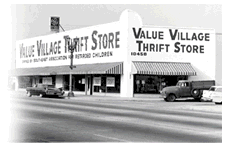
Corporate Thrift Store, Continued
Some friends write: "Why should you care?" Well, for several reasons.
When I was in high school, and even well on into university, CTS was the book scouting resource for anyone who took their trade seriously. Gavin, my old friend and manager at Book and Comic Emporium, took pity on my lack of scouting savvy one day, informed me that I was buying him lunch in return for his time, and loaded me onto the #9 bus. We went to the big CTS on East Hastings, not so far from the location of Jeff Wall's Milk. Gavin stationed himself beside me as I worked through bookcase after bookcase of potential purchases. "Take that one." "Don't take that, it's water-damaged." "That's overpriced." "Check that one, it's a PBO [paperback original]." Lots of other scouts wandered past us; they all seemed to know Gavin, and to be vaguely amused by me and the selections stacked in my red plastic shopping basket. I felt like I was being initiated into the Freemasons, or some other secret society.
Every time I walk into CTS, with its big bright trays of fluorescent light and the smell of freshly-laundered clothing, I experience a brief but potent pang of nostalgia for the scouting trips I took by bus, c. 1990-95, to the far ends of Vancouver and suburbs: Victoria Drive; Edmonds; Langley; North Road. This was not a particularly happy time in my life, and these trips always made me feel better, even when they were conducted in the snow, or the pouring rain.
In 1999, having determined that I was probably going to kill myself if I had to keep working at the UBC library, I cashed out my RRSP [Registered Retirement Savings Plan, the Canadian equivalent of a US IRA], and booked two weeks of holidays and an extra week of unpaid leave for early April. I rented a Toyota Corolla and drove south by southwest from Vancouver, passing through Boise, Salt Lake City, Las Vegas, Phoenix, Tucson, Santa Fe, Colorado Springs, Denver, Boise [again], Portland and Seattle. I visited approximately two hundred different thrift stores, including many CTS franchises, and filled the car six times. Gavin had told me I would need approximately 10,000 different titles to open a used bookstore of my own, and I tried to come as close to that total as I possibly could.
Stepping over the threshold of CTS -- any CTS -- always reminds me of that three-week trip, and the alternating sensations of giddy elation and near-suicidal depression that accompanied me. "You burn your bridges pretty good," D. observed last week, as we labored up the side of Mount Strachan. Well, yes, and on that 1999 trip I was very conscious of setting the fuses and lighting the matches, and also of how few matches were left in the pack. But there were also brief moments of happiness that will stay with me my whole life: the huge, half-pound bean and cheese burrito that I bought from a Mexican taco truck in a CTS parking lot in suburban Tucson; the sidewalk ice outside the motel in Cortez, Colorado; and the music on REM's lovely and totally neglected album Up, which was always on in the car, Michael Stipe's sad resigned voice a constant comfort as I crossed and recrossed the high plateau country in the thickly falling, weirdly unseasonal snow that began in eastern Oregon and didn't let up until Phoenix.
Sunday, October 15, 2006

Two days trundling around the Pacific Northwest in a rented Nissan Sentra, hunting mass market ("pocket") paperbacks. How many books fit into a Sentra? If there are no other passengers beyond the driver and his backpack, approximately 2600. A pretty tight pack job; the Canadian customs guy at the border actually called two of his pals out to the booth to have a look. Oh Christ, I thought, they're going to tear the car apart. But they just wanted to admire my handiwork, books stacked up inside like planks in a Tadashi Kawamata installation.
Corporate Thrift Store, above, used to be a great book scouting resource, but is now sadly no longer. For those not in the know, Corporate Thrift Store "partners" with local charities, paying a bulk rate for materials delivered by the charity to CTS' stores. CTS then re-prices the merchandise and makes a killing off shoppers laboring under the impression that all, or most, of their retail dollars are going to the charity, and not to Corporate Thrift Store.
I have some problems with this business model as a business owner, and as a citizen. But let's think dialectically for a moment, like a CTS PR flack. CTS obviously has expenses. Rent (the stores are huge, and sit on valuable urban properties); wages (lots of staff); storage and transportation (someone has to move all that merchandise from distribution center to individual store). And common sense suggests that most of what is donated to a charity -- any charity -- will be unsaleable crap. The charity will say, "Thanks," because it doesn't want to offend donors, but accepting used merchandise and being able to do anything with it are two entirely different things. I encounter this problem every day in my own business. "Why won't you take these out-of-date textbooks?" Well, because they're unsaleable, and if I fail to sell them, I incur a disposal cost in making them go away. So taking unsaleable merchandise for "free" often ends up being "not free," once the material goes to the landfill or the recycler, who charge for their service on a per-pound basis.
Let's be charitable and assume that 50% of what the "charity partner" delivers to CTS is unsaleable crap, which CTS must dispose of at a net cost. CTS still makes a killing when they negotiate the supply agreement. As CTS is a privately held business, the supply agreement is a trade secret. But having done more than a little research, my educated and not totally impartial guess is that it goes something like this:
CTS: We can offer you 10 cents a pound.
CHARITY PARTNER: Woo-hoo!
Notice how the supply agreeement detaches quantity from value. The charity partner doesn't really care about the total dollar value, because they have no economic investment in the goods they're supplying. After all, the goods are "free goods," collected by a staff of volunteers.
CTS, on the other hand, is now positioned to make out like a bandit. Do the math:
10 pounds of paperback books = approximately 50 books. Cost to CTS, $1.
Throw out 50% of the total as "unsaleable junk." 25 books remain.
Price those 25 books at CTS retail. Say 15 books are nothing special. $2/each. 5 are better quality. $3/each. 5 are "collectable" or rare. $5/each.
$30 + $15 + $25 = $70!
Don your CTS flak hat again. "Not all those books will sell. Some will sell at a discount (seniors' day; discount coupons; 'special promotions'). And we've got disposal costs, wages, rent..." So, let's be charitable and say that that $1 laid out returns not $70, but $50 to CTS' coffers. A mark-up of 5000%! Ka-ching!
These margins are insulting to CTS' "charity partners," and to those few CTS customers who still believe that CTS is a charity, or that the majority of CTS' profits go to charities.
I-5 playlist, Vancouver --> Tukwila, WA and return
Cee-Lo, Cee-Lo Green is The Soul Machine
Steely Dan, The Royal Scam
Cat Power, The Greatest
Al Green, The Absolute Best
Stephen Morrissey, Live at Earls Court
Marvin Gaye, What's Going On
Steely Dan, Two Against Nature
Charlie Parker, All Stars Live at the Royal Roost
Steely Dan, Aja
Gnarls Barkley, Saint Elsewhere
Marian McPartland, Piano Jazz (feat. Steely Dan)
Friday, October 13, 2006
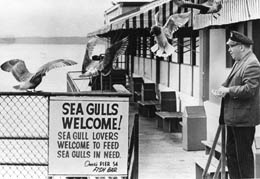
On the road south, Arthur Russell on the deck, in search of mass market paperbacks.
Stephen King: "When you're young, optimism is a perfectly appropriate response to failure."
Is it all over my face?
Tuesday, October 10, 2006
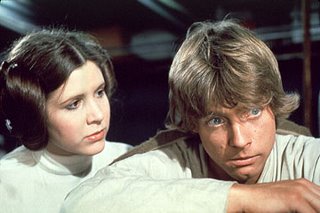
Best Craigslist.org "Casual Encounters" Ad Ever!
"YOU ARE HOTTER THAN LEIA - m4w - 26
Here it is ladies, I am a 26 year old fanboy who has acquired a Leia bikini from Star Wars Episode 6, Return of the Jedi. I want a voluptuous woman to fill this out so I can fill her out. Sense of adventure appreciated, this is my lifelong fantasy and I don't care how old you are, just above 18. No bullshit please, this is serious and I would appreciate serious e-mails only. Please send me your pic and I will return with mine."
(Unusual spelling and diction preserved in situ; Mark Hamill (above right) visibly traumatized at the prospect)
Monday, October 09, 2006

Voyager
Bernadette used to joke that I'd never come out and actually claim depression, always preferring my inner weather to simply map itself onto the world. There's a certain slant of light, & etc. McCarthy's The Road turns out to be a pretty accurate mental map of what that inner weather looks like, all dirty radioactive snow, grey clouds, and iron-colored breakers rolling in off the Gulf of Mexico. The landscape's looked that way for so long that I sometimes forget there's an outside. Then something good happens (sunset in Garibaldi Park; a McCarthy sentence; an unusually attentive Toronto audience) and the world shivers at its edges.
(Cohen's crack that lets the light in)
What would it take to make you happy?, asked one of the staff the other day, genuinely puzzled.
Diminished expectations, I guess, though total lack of expectations smells like cynicism to me. I suppose creative productivity (business ownership; gallery managing; elevation gaining; stock tracking) is a fundamental gut-level response to depression. Evidence of oneself. Or, at the very least, fuel for projects to gain enough velocity to climb out of the emotional gravity well surrounding Planet Christopher and start their journey someplace new.
Michelina is a Voyager spacecraft. The photographs are, too. Ditto the "art criticism."
"The Voyagers have enough electrical power and thruster fuel to operate at least until 2020. By that time, Voyager 1 will be 12.4 billion miles (19.9 billion KM) from the Sun and Voyager 2 will be 10.5 billion miles (16.9 billion KM) away. Eventually, the Voyagers will pass other stars. In about 40,000 years, Voyager 1 will drift within 1.6 light years (9.3 trillion miles) of AC+79 3888, a star in the constellation of Camelopardalis. In some 296,000 years, Voyager 2 will pass 4.3 light years (25 trillion miles) from Sirius, the brightest star in the sky . The Voyagers are destined—perhaps eternally—to wander the Milky Way."

Kevin Madill
The Architect's Wife
CSA Space
#5 - 2414 Main Street
Vancouver, British Columbia, Canada
Curated by Christopher Brayshaw
Opening Thursday 12 October 2006, 6-9pm
One large photograph, plus the usual cold beer, wine, vintage Savarin coffee tin, and swarm of hipster intellectuals. Y'all come!
Sunday, October 08, 2006
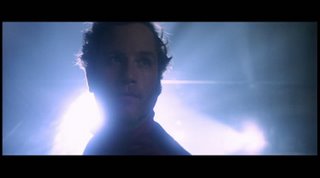
Steven Spielberg, Close Encounters of the Third Kind:
"In another cubicle, Neary was now dressing in a red jumpsuit similar to the astronauts'.
'Mr. Neary,' the M.C. was saying, 'our staff has prepared just a few basic documents that need your signature. This first just states that you have requested special status within the Mayflower Project of your own volition and have not been coerced into participating.'"

2014
Not a typo. For the longest time I've been trying to work out the repercussions of First Contact being made not with political leadership, nor with the military-industrial complex, but with a visual artist. Then, the other night, riding Skytrain, I glanced out over Metrotown's lights and had an exceptionally vivid memory of Spielberg's little grey guys leading Richard Dreyfuss up onto the mother ship. How, I wondered, would things change if that was Rodney Graham, and not a telephone lineman, getting on board? Uncommon Carriers, John McPhee's new collection of New Yorker essays, provided a point of departure. I still can't write short stories to save my life, but apparently have no such problem transcribing art criticism from the future.
Saturday, October 07, 2006
An Oldie From the Vaults
Another bottle from the past, washed up on the shores of the internets. Circa 1997. Not too many copies of this one floating around any more. A polemical essay plus a list of works that's generated many email requests for clarification and/or JPEGs over the years. So far as I know, all of the participants are still making and exhibiting art. The thesis and curator's choices pleased no one, least of all the salon de refuses furiously smoking out on Catriona's back porch, but the show is still fondly recalled to me from time to time by folks whose memories of it are apparently less raw than mine.
Friday, October 06, 2006
Thursday, October 05, 2006
Michelina in the World
After over a year of neglect, I re-edited the Michelina manuscript (21,000 words!) and posted it, along with some of Tolagson's paintings and drawings, to Local Publisher Most Likely to Not Totally Reject Us Out of Hand.
A weird week, occasioned by more silver in my hair, sore fingers, and McCarthy's The Road, which isn't exactly what you'd call a cheerful pick-me-up.
Still the beat bangs, still doing my thang
Since I left, ain't too much changed, still...
Wednesday, October 04, 2006

Clutches of Sad Remains
Half-finished Cormac McCarthy's The Road early this morning, up late with Bowie's Aladdin Sane on the stereo, trying and failing to get back to sleep at 3 a.m. after being roused by some drunken asshole down in the street bellowing, "Come back, bitch, and HAVE SOME MORE!" at the top of his lungs. Lights on all up and down the block, apartment windows banging up. A strangely prompt VPD cruiser, its radio clearly audible on the sixth floor, the red and blue bubble lights slowly turning, casting colored shadows up the blinds, like a hovering jukebox, or Close Encounters' mother ship. So, with sleep impossible, and the cats blinking at me from the bureau, I folded the futon up into its couch configuration and began McCarthy's short, dense tale of a man and his son making their way south by southwest through a postapocalyptic landscape alternately reminiscent of McCarthy's own Blood Meridian, Paul Auster's In The Country of Last Things, George Romero's zombie series, and Jack Ketchum's Off Season. At some point, Mike Garson's piano work on Aladdin Sane's title cut began to rub against McCarthy's tongue-in-groove prose.
For the first minute or two, Garson's piano notes are spaced above, and only roughly parallel to, the steady one-two beat of guitar, bass guitar, and Bowie's voice, only occasionally dropping into lock step: once to echo the hilarious phrase, "Saddening glissando strings," and twice for the "Uh-h-h-uh-h-uh" refrain. Then, midway through, a free-form piano solo ends in pure abstraction, notes sprinkled like paint on a Pollock canvas.
It seems to me that Garson's performance -- first emulating his fellow performers, but at some distance from them, then later departing into an extended jazz solo -- resembles McCarthy's prose, which also oscillates between "spare" naturalistic description and more grammatically and symbolically abstract compositions. Two passages, picked at random from The Road's first half, well illustrate these ostensibly opposed tendencies in McCarthy's style:
"He woke toward the morning with the fire down to coals and walked out to the road. Everything was alight. As if the lost sun were returning at last. The snow orange and quivering. A forest fire was making its way along the tinderbox ridges above them, flaring and shimmering against the overcast like the northern lights. Cold as it was he stood there a long time. The color of it moved something in him long forgetten."
"He tried to think of something to say but he could not. He'd had this feeling before, beyond the numbness and the dull despair. The world shrinking down about a raw core of parsible entities. The names of things slowly following those things into oblivion. Colors. The names of birds. Things to eat. Finally the names of things one believed to be true. More fragile than he would have thought. How much was gone already? The sacred idiom shorn of its referents and so of its reality. Drawing down like something trying to preserve heat. In time to wink out forever."
Many critics who admire McCarthy's plainer prose ("He woke toward the morning with the fire down to coals and walked out to the road") seem to dislike, or at least to be visibly puzzled by, his frequent shifts into abstraction ("The sacred idiom shorn of its referents and so of its reality"). To me these are all one piece, just like Garson's performance. McCarthy's "abstract" passages are summaries of content; they repeat, with great compression and emphasis, the content of surrounding paragraphs, seeking to break content free from things, just as Garson's "abstract" solo retains its own internal logic, a logic resolutely opposed to playing in time with the rest of the band.
Tuesday, October 03, 2006

ACT (Aesthetically Claimed Thing): The Shadowlands Ghost Hunter Store ("Ghost Hunting's One Stop Shop")
New books momentarily leaving the shop in my pack:
Cormac McCarthy, The Road
David Adams Richards, The Friends of Meager Fortune
Alice Munro, The View From Castle Rock
Marisha Pessl, Special Topics in Calamity Physics
Margaret Atwood, Oryx & Crake (to settle a bet with D.)
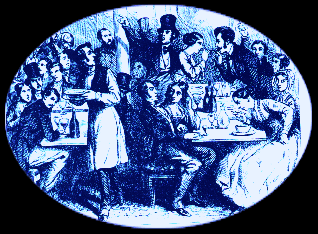
Mail from the Fillip Review, announcing issue #4 -- which includes my essay, "Feldmann's Tact," and a piece by Adam Harrison on Mark Lewis -- and a launch party this Thursday at the Marine Club, 573 Homer Street, from 8-11 p.m. If you live in Vancouver and think that drinking in a dingy overpriced upstairs bar with a bunch of neurotic highbrow intellectuals might be a fun way to spend your Thursday evening, c'mon down. I'm the bald guy in the oversize plaid.
"The Fillip Review and The Projectile Publishing Society are pleased to announce the release of the fourth issue of Fillip.
Fillip is a publication of art, culture, and ideas issued three times a year by the Projectile Publishing Society from Vancouver, British Columbia. Crossing academic, artistic, and related practices, Fillip acts as a forum for critical discussion in the contemporary arts and situates itself as a complement and stimulus for contemporary practices and discourses.
The fourth issue of Fillip includes essays and reviews by an international group of writers and artists.
Essays
Luis Camnitzer Art of the State
Barnaby Drabble We Want Everything: Assembled Thoughts on Artist-led Culture in Zürich
Interviews
Jordan Strom with Cao Fei
Exhibition Reviews
Warren Arcan on Jimmie Durham: Knew Urk
Ryan Aronofsky on Marina Roy and Philip McCrum
Ryan Aronofsky on Marina Roy and Philip McCrum
Christopher Brayshaw on Hans-Peter Feldmann
Colin Browne on the Quai Branly Museum
Caroline Busta on the Miguel Abreu Gallery, New York
Susanna Haddon on Arsenal: Sound as a Weapon
Adam Harrison on Mark Lewis
Antonia Hirsch & Melanie O’Brian on Of Mice and Men
Rebecca Lane on Douglas Gordon: Timeline
Fionn Meade on Boys and Flowers
Kristina Lee Podesva on the Emergency Biennale in Chechnya
Book Reviews
Eli Bornowsky on Jacques Rancière's The Politics of Aesthetics
Zoë Gray on Sven Lütticken's Secret Publicity
Fillip 4 also includes insert projects by San Francisco-based artist Stephanie Syjuco, and Vancouver and Vienna-based artists Sabine Bitter and Helmut Weber (co-produced by the Western Front Society)."

Long walk home across the Cambie Bridge at 2:15 a.m.
Yaletown's sporadic lights yellow like the moon.
The clink of illicit sailboats' rigging in the dark. ("False Creek liveaboards")
High clouds sweeping through.
Monday, October 02, 2006
More grist for the never-fly-anywhere-you-don't-absolutely-have-to mill, courtesy NYT staff writer Joe Sharkey:
"At the police headquarters, we were required to write on a sheet of paper our names, addresses, birthdates, occupations and levels of education, plus the names of our parents. We were all also required to submit to an examination by a physician with long hair who wore a white gown that draped almost to his shins.
We were required to strip to the waists for photographs front and back.This, explained the physician, whose name I did not get but who described himself to me as a 'forensic doctor,' was to prove that we had not been tortured 'in any way.'"
Sunday, October 01, 2006

Some Readers Write (Or Don't)
Sunday morning with the Anodyne mailbag:
Two requests for the Buffett Partnership Letters (still available as a hefty MS Word file, with a few common sense restrictions on its re-use and distribution). One request from Eastern Europe for "a MP3 copy of Steely Dan's Aja," which I don't have and wouldn't distribute if I did. Stock market spam in a dozen different flavors: diamond mining, uranium mining, something to do with computers, oil exploration in a remote location probably not too far from Aja Requester's hometown. Diatribe from Toronto defending Canadian Art and hack critic R.M. Vaughan, whose goofy syntax, strangely rushed quality, and originating IP address smells like an OCAD class assignment. Short complimentary note from someone in Toronto who came to my Evan Lee talk and liked it. More stock market spam. No responses to last week's "analyze these TSE-listed companies" challenge (Norbord, Inc. looks undervalued to me; Peyto Energy Trust reminds me of that friendly fellow from camp with the hockey mask and butcher knife). Someone advancing the opinion that art critics shouldn't try making art themselves. Someone else -- probably a classmate of my old pal Ryan Aronofsky -- advancing a variation on that theme, namely, that my photographs "look like they were taken by an art critic, not an artist." At least this correspondent helpfully provides a link to their own pictures, best described as lushly colored images of clouds, plants, and running water. Thanks, everyone.
Archives
03/01/2004 - 04/01/2004
04/01/2004 - 05/01/2004
05/01/2004 - 06/01/2004
06/01/2004 - 07/01/2004
07/01/2004 - 08/01/2004
08/01/2004 - 09/01/2004
09/01/2004 - 10/01/2004
10/01/2004 - 11/01/2004
11/01/2004 - 12/01/2004
12/01/2004 - 01/01/2005
01/01/2005 - 02/01/2005
02/01/2005 - 03/01/2005
03/01/2005 - 04/01/2005
04/01/2005 - 05/01/2005
05/01/2005 - 06/01/2005
06/01/2005 - 07/01/2005
07/01/2005 - 08/01/2005
08/01/2005 - 09/01/2005
09/01/2005 - 10/01/2005
10/01/2005 - 11/01/2005
11/01/2005 - 12/01/2005
12/01/2005 - 01/01/2006
01/01/2006 - 02/01/2006
02/01/2006 - 03/01/2006
03/01/2006 - 04/01/2006
04/01/2006 - 05/01/2006
05/01/2006 - 06/01/2006
06/01/2006 - 07/01/2006
07/01/2006 - 08/01/2006
08/01/2006 - 09/01/2006
09/01/2006 - 10/01/2006
10/01/2006 - 11/01/2006
11/01/2006 - 12/01/2006
12/01/2006 - 01/01/2007
01/01/2007 - 02/01/2007
02/01/2007 - 03/01/2007
03/01/2007 - 04/01/2007
04/01/2007 - 05/01/2007
05/01/2007 - 06/01/2007
06/01/2007 - 07/01/2007
07/01/2007 - 08/01/2007
08/01/2007 - 09/01/2007
09/01/2007 - 10/01/2007
10/01/2007 - 11/01/2007
11/01/2007 - 12/01/2007
12/01/2007 - 01/01/2008
01/01/2008 - 02/01/2008
02/01/2008 - 03/01/2008
03/01/2008 - 04/01/2008
04/01/2008 - 05/01/2008
05/01/2008 - 06/01/2008
06/01/2008 - 07/01/2008
07/01/2008 - 08/01/2008
08/01/2008 - 09/01/2008
09/01/2008 - 10/01/2008
10/01/2008 - 11/01/2008
11/01/2008 - 12/01/2008
12/01/2008 - 01/01/2009
01/01/2009 - 02/01/2009
02/01/2009 - 03/01/2009
03/01/2009 - 04/01/2009
04/01/2009 - 05/01/2009
05/01/2009 - 06/01/2009
06/01/2009 - 07/01/2009
07/01/2009 - 08/01/2009
08/01/2009 - 09/01/2009
09/01/2009 - 10/01/2009
10/01/2009 - 11/01/2009
11/01/2009 - 12/01/2009
12/01/2009 - 01/01/2010
01/01/2010 - 02/01/2010
02/01/2010 - 03/01/2010
03/01/2010 - 04/01/2010
04/01/2010 - 05/01/2010
05/01/2010 - 06/01/2010
06/01/2010 - 07/01/2010
07/01/2010 - 08/01/2010
08/01/2010 - 09/01/2010
09/01/2010 - 10/01/2010
10/01/2010 - 11/01/2010
11/01/2010 - 12/01/2010
12/01/2010 - 01/01/2011
01/01/2011 - 02/01/2011
02/01/2011 - 03/01/2011
03/01/2011 - 04/01/2011
04/01/2011 - 05/01/2011
05/01/2011 - 06/01/2011
06/01/2011 - 07/01/2011
07/01/2011 - 08/01/2011
08/01/2011 - 09/01/2011
09/01/2011 - 10/01/2011
10/01/2011 - 11/01/2011
11/01/2011 - 12/01/2011
12/01/2011 - 01/01/2012
01/01/2012 - 02/01/2012
02/01/2012 - 03/01/2012
03/01/2012 - 04/01/2012
04/01/2012 - 05/01/2012
05/01/2012 - 06/01/2012
06/01/2012 - 07/01/2012
07/01/2012 - 08/01/2012
08/01/2012 - 09/01/2012
09/01/2012 - 10/01/2012
10/01/2012 - 11/01/2012
11/01/2012 - 12/01/2012
12/01/2012 - 01/01/2013
01/01/2013 - 02/01/2013
02/01/2013 - 03/01/2013
03/01/2013 - 04/01/2013
04/01/2013 - 05/01/2013
05/01/2013 - 06/01/2013
06/01/2013 - 07/01/2013
07/01/2013 - 08/01/2013
08/01/2013 - 09/01/2013
09/01/2013 - 10/01/2013
10/01/2013 - 11/01/2013
11/01/2013 - 12/01/2013
12/01/2013 - 01/01/2014
01/01/2014 - 02/01/2014
02/01/2014 - 03/01/2014
03/01/2014 - 04/01/2014
04/01/2014 - 05/01/2014
05/01/2014 - 06/01/2014
06/01/2014 - 07/01/2014
07/01/2014 - 08/01/2014
08/01/2014 - 09/01/2014
09/01/2014 - 10/01/2014
10/01/2014 - 11/01/2014
11/01/2014 - 12/01/2014
12/01/2014 - 01/01/2015
01/01/2015 - 02/01/2015
02/01/2015 - 03/01/2015
03/01/2015 - 04/01/2015
04/01/2015 - 05/01/2015
05/01/2015 - 06/01/2015
06/01/2015 - 07/01/2015
07/01/2015 - 08/01/2015
08/01/2015 - 09/01/2015
09/01/2015 - 10/01/2015
10/01/2015 - 11/01/2015
11/01/2015 - 12/01/2015
12/01/2015 - 01/01/2016
01/01/2016 - 02/01/2016
02/01/2016 - 03/01/2016
03/01/2016 - 04/01/2016
04/01/2016 - 05/01/2016
05/01/2016 - 06/01/2016
06/01/2016 - 07/01/2016
07/01/2016 - 08/01/2016
08/01/2016 - 09/01/2016
09/01/2016 - 10/01/2016
10/01/2016 - 11/01/2016
11/01/2016 - 12/01/2016
12/01/2016 - 01/01/2017
01/01/2017 - 02/01/2017
02/01/2017 - 03/01/2017
03/01/2017 - 04/01/2017
04/01/2017 - 05/01/2017
05/01/2017 - 06/01/2017
06/01/2017 - 07/01/2017
07/01/2017 - 08/01/2017
08/01/2017 - 09/01/2017
09/01/2017 - 10/01/2017
10/01/2017 - 11/01/2017
11/01/2017 - 12/01/2017
12/01/2017 - 01/01/2018
01/01/2018 - 02/01/2018
02/01/2018 - 03/01/2018
03/01/2018 - 04/01/2018
04/01/2018 - 05/01/2018
05/01/2018 - 06/01/2018
06/01/2018 - 07/01/2018
07/01/2018 - 08/01/2018
08/01/2018 - 09/01/2018
09/01/2018 - 10/01/2018
10/01/2018 - 11/01/2018
11/01/2018 - 12/01/2018
12/01/2018 - 01/01/2019
01/01/2019 - 02/01/2019
02/01/2019 - 03/01/2019
03/01/2019 - 04/01/2019
04/01/2019 - 05/01/2019
05/01/2019 - 06/01/2019
06/01/2019 - 07/01/2019
07/01/2019 - 08/01/2019
08/01/2019 - 09/01/2019
09/01/2019 - 10/01/2019
10/01/2019 - 11/01/2019
11/01/2019 - 12/01/2019
12/01/2019 - 01/01/2020
01/01/2020 - 02/01/2020
02/01/2020 - 03/01/2020
03/01/2020 - 04/01/2020
04/01/2020 - 05/01/2020
05/01/2020 - 06/01/2020
06/01/2020 - 07/01/2020
07/01/2020 - 08/01/2020
08/01/2020 - 09/01/2020
09/01/2020 - 10/01/2020
10/01/2020 - 11/01/2020
11/01/2020 - 12/01/2020
12/01/2020 - 01/01/2021
01/01/2021 - 02/01/2021
02/01/2021 - 03/01/2021
03/01/2021 - 04/01/2021
04/01/2021 - 05/01/2021
05/01/2021 - 06/01/2021
06/01/2021 - 07/01/2021
07/01/2021 - 08/01/2021
08/01/2021 - 09/01/2021
09/01/2021 - 10/01/2021
10/01/2021 - 11/01/2021
11/01/2021 - 12/01/2021
12/01/2021 - 01/01/2022
01/01/2022 - 02/01/2022
02/01/2022 - 03/01/2022
05/01/2022 - 06/01/2022
06/01/2022 - 07/01/2022
12/01/2022 - 01/01/2023
01/01/2023 - 02/01/2023
03/01/2023 - 04/01/2023
05/01/2023 - 06/01/2023
08/01/2023 - 09/01/2023
11/01/2023 - 12/01/2023
04/01/2024 - 05/01/2024
05/01/2024 - 06/01/2024
03/01/2004 - 04/01/2004
04/01/2004 - 05/01/2004
05/01/2004 - 06/01/2004
06/01/2004 - 07/01/2004
07/01/2004 - 08/01/2004
08/01/2004 - 09/01/2004
09/01/2004 - 10/01/2004
10/01/2004 - 11/01/2004
11/01/2004 - 12/01/2004
12/01/2004 - 01/01/2005
01/01/2005 - 02/01/2005
02/01/2005 - 03/01/2005
03/01/2005 - 04/01/2005
04/01/2005 - 05/01/2005
05/01/2005 - 06/01/2005
06/01/2005 - 07/01/2005
07/01/2005 - 08/01/2005
08/01/2005 - 09/01/2005
09/01/2005 - 10/01/2005
10/01/2005 - 11/01/2005
11/01/2005 - 12/01/2005
12/01/2005 - 01/01/2006
01/01/2006 - 02/01/2006
02/01/2006 - 03/01/2006
03/01/2006 - 04/01/2006
04/01/2006 - 05/01/2006
05/01/2006 - 06/01/2006
06/01/2006 - 07/01/2006
07/01/2006 - 08/01/2006
08/01/2006 - 09/01/2006
09/01/2006 - 10/01/2006
10/01/2006 - 11/01/2006
11/01/2006 - 12/01/2006
12/01/2006 - 01/01/2007
01/01/2007 - 02/01/2007
02/01/2007 - 03/01/2007
03/01/2007 - 04/01/2007
04/01/2007 - 05/01/2007
05/01/2007 - 06/01/2007
06/01/2007 - 07/01/2007
07/01/2007 - 08/01/2007
08/01/2007 - 09/01/2007
09/01/2007 - 10/01/2007
10/01/2007 - 11/01/2007
11/01/2007 - 12/01/2007
12/01/2007 - 01/01/2008
01/01/2008 - 02/01/2008
02/01/2008 - 03/01/2008
03/01/2008 - 04/01/2008
04/01/2008 - 05/01/2008
05/01/2008 - 06/01/2008
06/01/2008 - 07/01/2008
07/01/2008 - 08/01/2008
08/01/2008 - 09/01/2008
09/01/2008 - 10/01/2008
10/01/2008 - 11/01/2008
11/01/2008 - 12/01/2008
12/01/2008 - 01/01/2009
01/01/2009 - 02/01/2009
02/01/2009 - 03/01/2009
03/01/2009 - 04/01/2009
04/01/2009 - 05/01/2009
05/01/2009 - 06/01/2009
06/01/2009 - 07/01/2009
07/01/2009 - 08/01/2009
08/01/2009 - 09/01/2009
09/01/2009 - 10/01/2009
10/01/2009 - 11/01/2009
11/01/2009 - 12/01/2009
12/01/2009 - 01/01/2010
01/01/2010 - 02/01/2010
02/01/2010 - 03/01/2010
03/01/2010 - 04/01/2010
04/01/2010 - 05/01/2010
05/01/2010 - 06/01/2010
06/01/2010 - 07/01/2010
07/01/2010 - 08/01/2010
08/01/2010 - 09/01/2010
09/01/2010 - 10/01/2010
10/01/2010 - 11/01/2010
11/01/2010 - 12/01/2010
12/01/2010 - 01/01/2011
01/01/2011 - 02/01/2011
02/01/2011 - 03/01/2011
03/01/2011 - 04/01/2011
04/01/2011 - 05/01/2011
05/01/2011 - 06/01/2011
06/01/2011 - 07/01/2011
07/01/2011 - 08/01/2011
08/01/2011 - 09/01/2011
09/01/2011 - 10/01/2011
10/01/2011 - 11/01/2011
11/01/2011 - 12/01/2011
12/01/2011 - 01/01/2012
01/01/2012 - 02/01/2012
02/01/2012 - 03/01/2012
03/01/2012 - 04/01/2012
04/01/2012 - 05/01/2012
05/01/2012 - 06/01/2012
06/01/2012 - 07/01/2012
07/01/2012 - 08/01/2012
08/01/2012 - 09/01/2012
09/01/2012 - 10/01/2012
10/01/2012 - 11/01/2012
11/01/2012 - 12/01/2012
12/01/2012 - 01/01/2013
01/01/2013 - 02/01/2013
02/01/2013 - 03/01/2013
03/01/2013 - 04/01/2013
04/01/2013 - 05/01/2013
05/01/2013 - 06/01/2013
06/01/2013 - 07/01/2013
07/01/2013 - 08/01/2013
08/01/2013 - 09/01/2013
09/01/2013 - 10/01/2013
10/01/2013 - 11/01/2013
11/01/2013 - 12/01/2013
12/01/2013 - 01/01/2014
01/01/2014 - 02/01/2014
02/01/2014 - 03/01/2014
03/01/2014 - 04/01/2014
04/01/2014 - 05/01/2014
05/01/2014 - 06/01/2014
06/01/2014 - 07/01/2014
07/01/2014 - 08/01/2014
08/01/2014 - 09/01/2014
09/01/2014 - 10/01/2014
10/01/2014 - 11/01/2014
11/01/2014 - 12/01/2014
12/01/2014 - 01/01/2015
01/01/2015 - 02/01/2015
02/01/2015 - 03/01/2015
03/01/2015 - 04/01/2015
04/01/2015 - 05/01/2015
05/01/2015 - 06/01/2015
06/01/2015 - 07/01/2015
07/01/2015 - 08/01/2015
08/01/2015 - 09/01/2015
09/01/2015 - 10/01/2015
10/01/2015 - 11/01/2015
11/01/2015 - 12/01/2015
12/01/2015 - 01/01/2016
01/01/2016 - 02/01/2016
02/01/2016 - 03/01/2016
03/01/2016 - 04/01/2016
04/01/2016 - 05/01/2016
05/01/2016 - 06/01/2016
06/01/2016 - 07/01/2016
07/01/2016 - 08/01/2016
08/01/2016 - 09/01/2016
09/01/2016 - 10/01/2016
10/01/2016 - 11/01/2016
11/01/2016 - 12/01/2016
12/01/2016 - 01/01/2017
01/01/2017 - 02/01/2017
02/01/2017 - 03/01/2017
03/01/2017 - 04/01/2017
04/01/2017 - 05/01/2017
05/01/2017 - 06/01/2017
06/01/2017 - 07/01/2017
07/01/2017 - 08/01/2017
08/01/2017 - 09/01/2017
09/01/2017 - 10/01/2017
10/01/2017 - 11/01/2017
11/01/2017 - 12/01/2017
12/01/2017 - 01/01/2018
01/01/2018 - 02/01/2018
02/01/2018 - 03/01/2018
03/01/2018 - 04/01/2018
04/01/2018 - 05/01/2018
05/01/2018 - 06/01/2018
06/01/2018 - 07/01/2018
07/01/2018 - 08/01/2018
08/01/2018 - 09/01/2018
09/01/2018 - 10/01/2018
10/01/2018 - 11/01/2018
11/01/2018 - 12/01/2018
12/01/2018 - 01/01/2019
01/01/2019 - 02/01/2019
02/01/2019 - 03/01/2019
03/01/2019 - 04/01/2019
04/01/2019 - 05/01/2019
05/01/2019 - 06/01/2019
06/01/2019 - 07/01/2019
07/01/2019 - 08/01/2019
08/01/2019 - 09/01/2019
09/01/2019 - 10/01/2019
10/01/2019 - 11/01/2019
11/01/2019 - 12/01/2019
12/01/2019 - 01/01/2020
01/01/2020 - 02/01/2020
02/01/2020 - 03/01/2020
03/01/2020 - 04/01/2020
04/01/2020 - 05/01/2020
05/01/2020 - 06/01/2020
06/01/2020 - 07/01/2020
07/01/2020 - 08/01/2020
08/01/2020 - 09/01/2020
09/01/2020 - 10/01/2020
10/01/2020 - 11/01/2020
11/01/2020 - 12/01/2020
12/01/2020 - 01/01/2021
01/01/2021 - 02/01/2021
02/01/2021 - 03/01/2021
03/01/2021 - 04/01/2021
04/01/2021 - 05/01/2021
05/01/2021 - 06/01/2021
06/01/2021 - 07/01/2021
07/01/2021 - 08/01/2021
08/01/2021 - 09/01/2021
09/01/2021 - 10/01/2021
10/01/2021 - 11/01/2021
11/01/2021 - 12/01/2021
12/01/2021 - 01/01/2022
01/01/2022 - 02/01/2022
02/01/2022 - 03/01/2022
05/01/2022 - 06/01/2022
06/01/2022 - 07/01/2022
12/01/2022 - 01/01/2023
01/01/2023 - 02/01/2023
03/01/2023 - 04/01/2023
05/01/2023 - 06/01/2023
08/01/2023 - 09/01/2023
11/01/2023 - 12/01/2023
04/01/2024 - 05/01/2024
05/01/2024 - 06/01/2024

